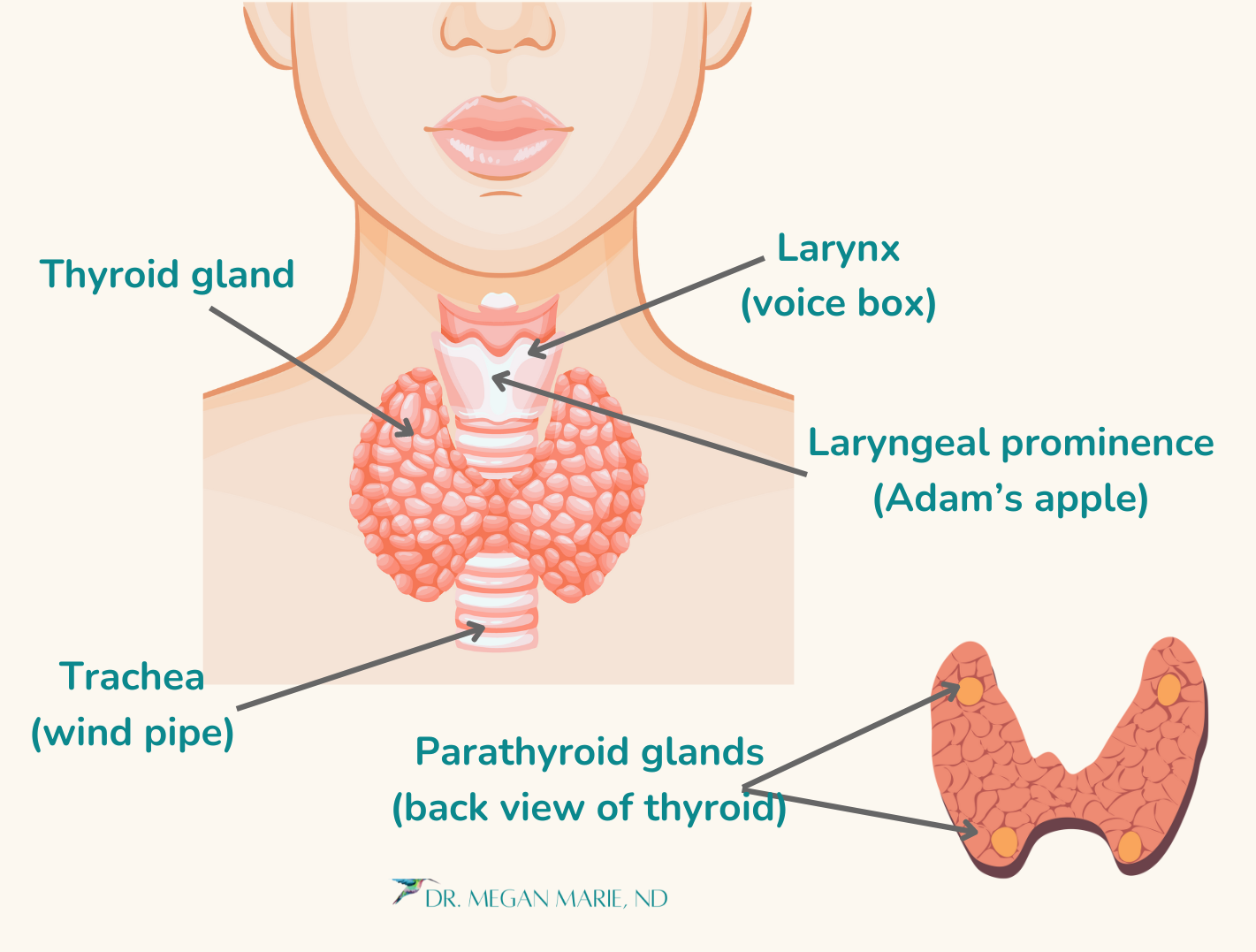Thyroid Gland: The Metabolism Manager
Last post we delved into the pituitary gland, “The Regulator” of the endocrine system. We explored which hormones it releases, and then which other target glands and tissues those hormones are signaling. Let’s dive into the first target gland on the list: the thyroid, your body’s metabolism manager.
The thyroid is a butterfly-shaped gland located in the front of the neck. It wraps around the trachea (your windpipe). If you find your “Adam’s apple,” your thyroid is just below that.
The main job of the thyroid is to manage your metabolism, your metabolic rate, which is essentially how your body transforms the food you eat into the energy every cell needs to function.
THE POWER OF THYROID HORMONES
The thyroid produces four clinically relevant hormones:
T4 (THYROXINE)
Think of T4 as the precursor to T3. T4 is inactive, meaning it can’t dock with cells and create metabolic changes like the active T3 can. T4 gets converted to T3 outside of the thyroid, mainly in the liver and kidneys (but elsewhere too, like the brain). This circles back to digestive health: if the liver is compromised, it can’t convert T4 to T3 (the active form). We need iodine to make this conversion happen. Optimally we want a free T4 blood test to be greater than 1.2-1.4mUL, and iodine to be between 100-199mcg/L (or 150-249 in pregnancy).
T3 (TRIIODOTHYRONINE)
The body makes less T3 than T4, because it’s far more potent. This is so the body has fine tune control of how much active thyroid is in circulation. T3 is what controls your metabolic rate, as well as your heart & digestive rate, brain development and function, plus musculoskeletal health & balance. Optimally we want a free T3 blood test to be greater than 3.2mUL.
rT3 (REVERSE T3)
T4 can also be converted into rT3, which is also biologically inactive and works to actually block T3. Think of rT3 like the thyroid’s brakes and T3 like the gas (and maybe T4 like the gear shift option). And the body will hit the brakes when it feels like conditions aren’t optimal, like when we’re sick, stressed, on a restricted diet, if our blood sugar isn’t regulated, in autoimmunity, etc. rT3 isn’t really something that we “treat,” but it’s a blood marker we use to see if treatment protocols are working. Optimally, we want rT3 to be below 10ng/dL, if it’s above that, the body is conserving energy, “using the brakes.”
CALCITONIN & PTH (PARATHYROID HORMONE)
Parathyroid hormone is actually released from the parathyroid glands, four pea-sized glands embedded in the back of the thyroid gland. Calcitonin and PTH work in concert to regulates the amount of calcium in our blood. PTH increase blood calcium by breaking down bone, and calcitonin decreases it by stopping bone breakdown (gas, brake).
Most of us just think calcium is for bones, but calcium helps our nerves function properly, helps us contract our muscles (so we can move), clots our blood (so we stop bleeding), and is so necessary for heart health. This is part of why vitamin D is so crucial, it helps us absorb calcium.
WHY THYROID HEALTH MATTERS
It’s important to understand that thyroid hormones affect every body system.
DIGESTIVE SYSTEM – remember the MMC (migrating motor complex)? Thyroid hormones influence gut motility by changing the rate of the MMC, how fast or slow food moves through.
NERVOUS SYSTEM – our nervous system controls our mood and our movements. Thyroid hormone imbalances can cause physical and mental-emotional symptoms, including temperature regulation issues.
MUSCULOSKELETAL SYSTEM – thyroid hormones are necessary for muscle development, contractility (moving your muscle), and muscle regeneration. Because your muscles make up so much of your body and need a lot of energy, any thyroid hormone imbalances can change how your muscles use energy, which in turn, affects your overall metabolism.
CARDIOVASCULAR SYSTEM – thyroid hormones influence our heart rate, cardiac out (how much blood the heart pumps, and how intensely the heart pumps blood (contractility).
REPRODUCTIVE SYSTEM – thyroid hormones impact fertility, as well as placental development.
So, it's kind of a big deal, huh?
HYPOTHYROID VS HYPERTHYROID
So, what happens if the gas and brakes aren’t working? The car either goes too fast or won’t go (and a few other nuances in between). Same with the thyroid. If we have too much thyroid, we have hyperthyroidism, if we don’t have enough, hypothyroidism. Looking back up at why the thyroid matters gives us a clue for what to look for if we have hypo- or hyperthyroidism.
HYPOTHYROIDISM (not enough)
Hypothyroidism means everything is going to slow down. This means the body’s going to struggle with:
fatigue & brain fog
constipation (slower motility)
maybe even SIBO (small intestinal bowel overgrowth) because again, things are slowed down so food is sitting where it isn’t supposed to for too long
weight gain & cold intolerance (because our metabolic rate, our fire, is slower)
joint & muscle pain, dry skin or dry, thinning hair (because repair & maintenance are down)
irregular menses or fertility issues
slower heart rate
depression
HYPERTHYROIDISM (too much)
Hypothyroidism means the opposite, everything speeds up. This means the body’s going to struggle with:
restlessness or irritability (feeling tired & wired)
diarrhea (faster motility)
maybe even GI upset because our gut bacteria diversity is reduced with faster motility
weight loss & heat intolerance (because our metabolic rate, our fire, is hotter)
muscle weakness, hair loss can also be here, plus itchy skin or dry eyes (because everything is overact)
sleep disturbances
peeing & being more thirsty
low libido
faster heart rate or palpitations
anxiety
WHAT DO I DO IF I HAVE THESE SYMPTOMS?
In conventional medicine, thyroid is evaluated with one blood test: TSH (thyroid stimulating hormone). If you fall in this (very) wide range of normal (optimal TSH is between 0.5-3.0mU/L), conventional docs have been trained to see tell you, “You’re fine, manage your stress better.” Or even worse, write you a script for a symptom.
This is heartbreaking on both sides. Doctors have to do continuing education to maintain their degrees, but it’s the rare doc who actually takes the time to delve into their CEUs, and even rarer to put that new info into practice. Part of this is because of malpractice fears (don’t rock the boat, and the boat won’t rock you), and partially, it’s just the curse of our current “health care” system (lack of time, provider burn out, and lack of incentives).
Holistic health care practitioners typically run (at least) TSH, free T3, free T4, reverse T3, and thyroid antibodies (more on that another time). These tests, plus your symptoms, give a much broader perspective on what’s going on with your thyroid, and provide clues as to the root cause of why your thyroid started going awry. Because, as you’ve just learned, your thyroid isn’t an island. It’s constantly working with your other body systems and other endocrine glands, especially your adrenal glands. The adrenal glands help manage the body’s stress response, and if the thyroid isn’t functioning well, the adrenals step in to support core needs. Which is why we’re going to talk about the adrenals “The Stress Responders” next week.
I hope you enjoyed learning about the thyroid, and all it does! Drop a comment below or reach out to me with questions, I look forward to continuing the Tour of the Body with you!




